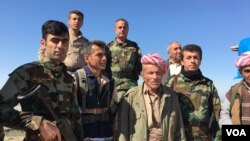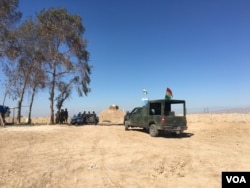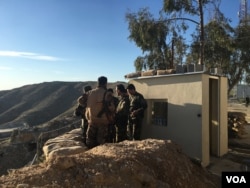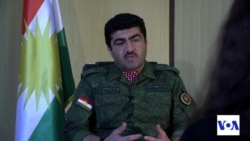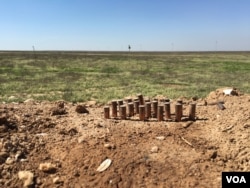Makhmour stands on the edge of the divide between the Iraqi Kurdish Peshmerga forces and Islamic State militants.
From behind the sandbags at the final Peshmerga base, on the horizon you can see a water tower with the black IS banner draped across it.
“That village,” one Peshmerga soldier said, pointing to a line of houses on the horizon, “is under the control of Daesh.”
IS fighters are tough
In 2014, the land the soldiers were standing on was also controlled by IS, or Daesh, as the group is known here.
It took two months of bloody fighting to oust the militants from the area and regain what the Kurds consider their territory.
At least one village still stands completely empty, it’s walls pockmarked with bullet holes. A large sign to the right of the bumpy road cutting through the houses warned against touching anything.
IS militants are known to plant bombs and booby trap areas they have occupied.
This is a familiar battlefield for Omar Mirhan, at 78 the eldest Peshmerga in the area. According to him, they killed all the IS fighters when they retook Makhmour’s 14 surrounding villages.
“They do not retreat,” Mirhan said, standing on top of a hill surrounded by his younger fighters, gesturing to the town below.
Highly respected fighter
Although retired and now only a volunteer, Mirhan is highly respected by his fellow Kurdish fighters.
He joined the Peshmerga in 1961, and has fought in every battle since then, including against former Iraqi leader Saddam Hussein.
Inside his lookout post, Mirhan rolled a cigarette with golden Kurdish tobacco, sipped tea and started to smoke.
The battle for Mosul, he said, was going to be tough, and he was not sure the Iraqi Army – which fled Mosul in 2014 – was up to the task.
“Do you want the Iraqi army to take Mosul? Unless American ground troops or Peshmerga go there, I swear to God, they can’t take Mosul,” he said.
There is little love lost between the Kurdish and Iraqi forces. Their military bases here are separate, and even though Kurdistan is still considered part of Iraq, the Peshmerga bases fly the Kurdish flag and only the Iraqi bases fly the Iraqi flag.
Cooperation
Major General Sirwan Barzani, commander for the Makhmour frontline, known as Sector 6, says the forces are coordinating. He met with VOA during a short visit to one of the posts overlooking the town of Makhmour.
WATCH: Peshmerga Commander Discusses Strategy Against IS
“There is an operation room, there is a joint operation room between the Iraqi army, the Ministry of Defense, and the Peshmerga ministry and the Americans and the coalition,” Barzani said.
But a lot more will be needed. Islamic State is a difficult enemy, he said. To take Mosul, Barzani said, airstrikes by coalition forces would not be enough; they would need attack helicopters.
More weapons, money
He called for more weapons and ammunition for his cash-strapped soldiers. “I have a maximum of five percent of my needs,” said the general.
A steep economic crisis in the Kurdistan region, combined with a bitter budget spat with the central government in Baghdad, has meant that salaries for many Peshmerga are in arrears by several months.
IS is developing new techniques, new ways of of using homemade bombs, it is using drones to gather intelligence and film its attacks, and it is experimenting with chemical weapons.
“They are dangerous people,” Barzani said.
Keeping it
But the real challenge, the Kurdish general said, was not just taking Mosul away from IS, but being able to keep it.
“You know it is not only a question of pushing Daesh back, you have to hold the land also,” said Barzani. “So I think they need at least 25,000 Iraqi army for this operation, and almost 10,000 Peshmerga.”
According to Barzani, Iraqi security forces were already moving into Makhmour, an area that lies southeast of Mosul and about 125 kilometers southwest of Irbil.
But he said it was unclear when and how the battle plan for Mosul will unfold, and what role the Iraqi Shi’ite militia will play in that fight.
“The plan has changed more than four or five times. So until today we still don't have a final plan,” Barzani said.




